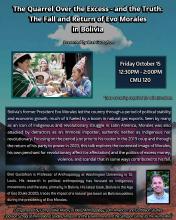The Quarrel Over the Excess - and the Truth: The Fall and Return of Evo Morales in Bolivia
Bret Gustafson
Friday October 15, 12:30-2:00
CMU 120
Bolivia's former President Evo Morales led the country through a period of political stability and economic growth, much of it fueled by a boom in natural gas exports. Seen by many as an icon of Indigenous and revolutionary struggle in Latin America, Morales was also attacked by detractors as an immoral imposter, authentic neither as Indigenous nor revolutionary. Focusing on the period just prior to his ouster in the 2019 coup and through the return of his party to power in 2020, this talk explores the contested image of Morales, his own penchant for revolutionary affect (or affectation) and the politics of excess money, violence, and scandal that in some ways contributed to his fall. Ongoing battles over whether the events of his ouster were a "coup" or a justified public reaction to "electoral fraud" continue to shape debates over Evo, even as the post-coup electoral victory of his party, the MAS (Movement to Socialism) has renewed his significance and charisma in Bolivian politics and beyond.
Bret Gustafson received a PhD in Social Anthropology from Harvard University and is currently a Professor of Anthropology at Washington University in St. Louis. His research in political anthropology has focused on Indigenous movements and the state, primarily in Bolivia. He is the author of New Languages of the State: Indigenous Resurgence and the Politics of Knowledge in Bolivia (Duke 2009) on the politics of Indigenous language education, and Bolivia in the Age of Gas (Duke 2020), which traces the impact of a natural gas boom on Bolivian politics during the presidency of Evo Morales.
Co-sponsored by Comparative History of Ideas, Anthropology, Latin American and Caribbean Studies, Jackson School of International Studies, Program on the Environment, and the Simpson Center for the Humanities.
